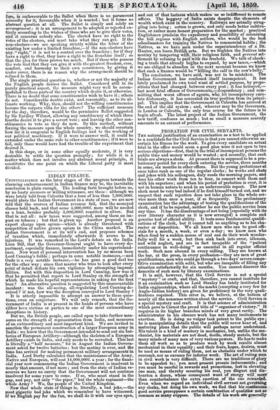INDIAN FINANCE.
UNrirrEmanum as the later stages of the progress towards the alarming embarrassment in Indian finance may be, the inevitable conclusion is plain enough. The leading facts brought before us, by no hasty accusers or willing witnesses, are these : although we were lately told from Calcutta that a loan of less than 7,000,000/. would plade the Indian Government in a state of ease, we are now told that the sources of Indian revenue fail, that the moneyed classes hold back, and that some 5,000,000/. more will be needed as a loan, besides probably 3,000,000/. remitted in silver. But that is not all : new taxes were suggested, among them an im- post on tobacco ; but that is given up. Another proposal is an export charge upon opium—which is already threatened with competition of native grown opium in the China market. The Indian Government is at its wit's end, and proposes schemes of taxation which, immediately afterwards it avows to be injurious. It was remarked in the Lord's debate on the India Loan Bill, that the Governor-General ought to have every de- partment, especially finance, immediately under his superintend- ence. Now want of personal intervention has by no means been Lord Canning's foible ; perhaps in some notable instances,—and Oude is a very notable instance,—he has gone a good deal too far the other way ; since that master who tries to look after every point of detail defeats his own vigilance by attempting impossi- bilities. But with this disposition in Lord. Canning, how was it that lie permitted that report to Lord Stanley on the strength of which lqie made his hopeful representations in asking for the first loan ? An alternative question is suggested by this unaccountable incident : was the all-seeing, all-regulating Lord Canning de- ceived? if not, how was the deception conveyed to Lord Stanley
It is utterly impossible to attempt an answer to these ques- tions, even on conjecture. We will only remark, that the Go- vernment of India is at present in the hands of persons who have either been victims or parties to one of the most extraordinary deceptions in history,. But we, the British people, are called upon to take further mea- sures on the strength of representation from India, and measures of an extraordinary and most important kind. We are invited to sanction the permanent construction of a larger European army in India : we know that the Government intended to send out six bat- teries of European Artillery—although the skeleton of a European Artillery exists in India, and only needs to be recruited. This last is literally a "half measure," for in August the Indian Govern- ment asked for twelve batteries ; but the mutiny is over, and the time has arrived for making permanent military arrangements in India. Lord Derby calculates that the maintenance of the Army, Native and European, will cost 14,000,000/. a year ; for the finan- cial year now commencing the Indian Government is insolvent to nearly that amount, if not more ; and from the state of Indian re- sources we have no surety that the Government will not continue insolvent for some years to come. If so, who must stand in the gap, and pay, not only "the piper," but the whole regiment—the whole Army ? We, the people of the United Kingdom. Now that whole state of things is, literally, a bad joke,—the most gigantic bad joke which we remember to have witnessed. If we English pay for the fun, we shall do it with our eyes open, and out of that laziness which makes us so indifferent to remote affairs. The beggary of India exists despite the elements of wealth which exist in the country. Railways are actually strug- gling into being ; cotton is grown, and only needs better cultiva- tion, or rather more honest preparation for the market ; practical Englishmen proclaim the expediency and possibility of colonizing the hill regions with English settlers, who would be the best schoolmasters for training the Natives to commercial habits ; the Natives, as we have seen under the superintendence of a Dr. Hunter, can learn British arts. But we frighten the Natives into mutiny by tampering with their religious faith, and prevent set- tlement by refusing to part with the freehold. We talk of check- ing a trade that already begins to expand, by new taxes,—which we are obliged to abandon in the next moment because we know that such a finance would be "killing the calf in the cow's belly." The conclusion, we have said, was not to be mistaken. The Indian Government has confessed itself incompetent. It has lately proclaimed its own total want of settled purpose, by propo- sitions that had changed between every post ; it has betrayed,— last most fatal offence of Governments,—despondency ; and com- mitting that worst offence of agents, who let incompetency emu- late dishonesty, it has concealed its true position from its princi- pal. This implies that the Government in Calcutta has arrived at the end of the old system ; and, whoever may be the Governors, in London or Calcutta, the only true course for the future is to begin afresh. The latest project of the Indian Government, the new tariff, confesses as much ; but so small a measure scarcely amounts to an earnest of performance.


























 Previous page
Previous page